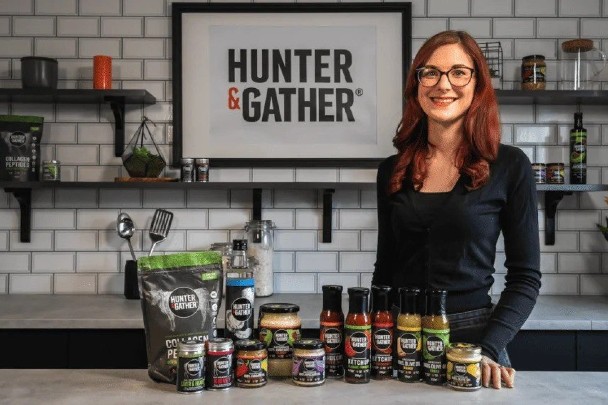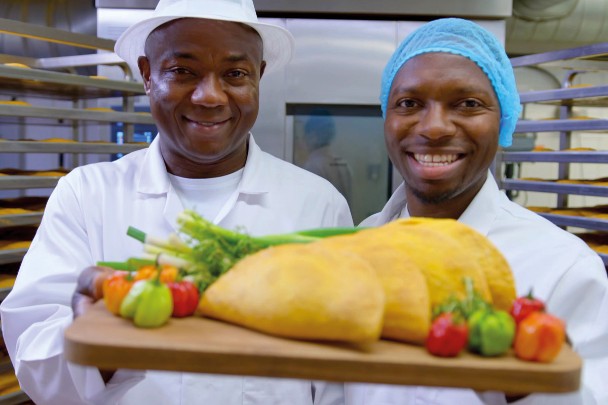March 24, 2025 Industry news
Getting listed and making those exciting first sales are two of the most significant milestones in any new business’s journey. However, breaking into retail can be daunting. Fierce competition, complex supply chains, and the increasingly high expectations of both retailers and consumers make it difficult for some businesses to get their foot in the door.
The good news is that many challenger brands do succeed, turning their vision into reality. While the process is challenging, proven strategies can help brands stand out, secure retailer interest and drive sales. We recently spoke with Mike Williams, co-founder of Flake Bake; Amy Moring, founder of Hunter & Gather; and fashion and brand consultant Clare Alexander to learn more.
From idea to aisle
Mike and Amy had distinct but equally inspiring journeys in bringing their products to market.

Amy Moring, founder of Hunter & Gather
Amy, co-founder of Hunter & Gather, a brand focused on nutrient-dense, sugar-free and grain-free products, shared how her business was built around her own belief in changing food habits.
“We realised that what people had been eating for the last fifty to a hundred years just wasn’t working for their health. We needed a platform to challenge the status quo,” said Amy.
However, breaking into the food industry meant overcoming some significant hurdles.
“We couldn’t afford to manufacture in the UK initially due to high costs, so we found a European manufacturer willing to do a small production run for our avocado mayo concept—the first of its kind in Europe.”
Mike, co-founder of Flake Bake, was inspired by his family, turning his father’s Caribbean takeaway into a growing food brand. “My dad had a small Caribbean food business making patties and bread. I saw an opportunity as demand for world foods was growing in supermarkets. I knew I could take that and scale it into something much bigger,” he explained.
His big break came when Aldi backed his first production batch. “They supported us through their TV show Aldi’s Next Big Thing, which gave us the credibility to approach manufacturers. Even then, it was tough. Some suppliers didn’t want to work with our ingredients and trials were expensive. One manufacturer charged us £20,000 just for a trial run.”
Both Mike and Amy’s experiences highlight the importance of finding the right manufacturer. Finding the right partner can make or break a business. A good partner will ensure product quality, cost efficiency and scalability, while the wrong one can lead to supply chain disruptions, inflated costs and even product failures. Startups should thoroughly research potential manufacturers, seeking those with the right experience and a willingness to accommodate smaller production runs.
Navigating manufacturing
One of the biggest pain points for any product-based businesses is manufacturing.

Clare Alexander, fashion & brand consultant
Clare Alexander stressed the importance of preparation when engaging with suppliers: “If you don’t provide manufacturers with clear specifications, you risk expensive errors and misinterpretations.”
Amy agreed, advising founders to use a tech pack, a document outlining all necessary specifications. “It includes measurements, fabric requirements, ingredients and barcodes—everything a manufacturer needs to create your product correctly,” she explained.
For Mike, outsourcing was a learning curve.
“We had to knock on a lot of doors to find someone who understood our product. Many manufacturers expect large minimum orders, so proving demand is key. Aldi’s endorsement helped us gain credibility, but we still had to network aggressively.”
For businesses unable to secure large contracts upfront, exploring small production runs or partnering with co-packers can offer alternative solutions. Small runs allow brands to test the market, refine their product and build demand without committing to high upfront costs.
Co-packers—third-party manufacturers that produce and package products on behalf of brands—offer a more flexible option by providing access to existing facilities, equipment and expertise. This approach can help startups scale gradually, manage cash flow and establish proof of concept before negotiating larger deals.
Funding and financial planning
Scaling a product-based business usually requires significant investment. Amy highlighted the importance of securing upfront funding for manufacturing. “You’re not going to scale to 20,000 units a week by cooking at home. You need infrastructure in place,” she said.
Mike advised founders to factor in hidden costs early on. “It’s not just about production—there are storage fees, distribution costs and packaging compliance. When we started, we underestimated just how much these expenses would add up.”
A strategic approach to funding, whether through grants, investment, or retailer partnerships, helps businesses secure the necessary capital to grow. By carefully planning and diversifying funding sources, companies can avoid relying too heavily on one revenue stream, which can protect against potential issues down the line. This not only helps ensure financial stability, it also positions businesses to seize opportunities and maintain a strong competitive edge by investing in innovation, new markets or scaling operations.
Retailer relations
Getting stocked by major retailers doesn’t happen overnight. Clare advised businesses to take a structured approach. “Retailers need to know that your product will sell before they commit shelf space. That means having proof of demand and a compelling story.”
Amy stressed the importance of brand positioning. “Retailers are looking for products that stand out. We had to show why Hunter & Gather was different from anything else on the market.”

Mike Williams, founder of Flake Bake (right) with his dad Paul
For Mike, persistence was key. “Manufacturers often wanted a retail contract before committing, but retailers wanted proof of production first. It was a chicken-and-egg situation. The breakthrough came when we used LinkedIn to connect with industry contacts and get introductions.”
His advice? Leverage your network and don’t be afraid to cold-call buyers. Building and nurturing relationships within your industry can unlock key insights, powerful introductions and unique opportunities that may otherwise be difficult to access.
Networking helps you stay informed about market trends, identify potential partners and establish credibility. While it may feel daunting, taking the initiative to directly connect with decision-makers demonstrates confidence, perseverance and a proactive approach to business development.
Marketing on a budget
Marketing doesn’t have to be expensive to be effective. Mike shared how Flake Bake used social media and storytelling to engage customers. “We built our brand through authenticity—sharing behind-the-scenes content and customer stories.”
Amy recommended strategic partnerships. “Collaborating with influencers, retailers or complementary brands can amplify your reach. You don’t always need a huge budget—just a creative approach.” All three agreed that consistency is crucial. “You need to keep showing up—whether it’s through email marketing, social media, or events,” said Clare.
Final thoughts
Making it in retail isn’t just about having a great product, it’s about finding the right people to bring it to life. The right manufacturer can make or break or business, so nail down the details early. Tech packs, barcodes, packaging etc., get it all right up front to avoid expensive headaches further down the line.
Money matters. Plan your funding strategy early so you’re not scrambling when it’s time to produce and distribute and, before you even think about pitching to retailers, prove people want what you’re selling. Start small by testing the waters with direct-to-consumer sales, limited production runs or partnerships that strengthen your brand.
Always remember, your network is one of your biggest assets, so use it. A warm introduction can get you in the door faster than a cold pitch ever will. Wwhen it comes to marketing, think beyond ads. Tell your story cconvincingly, engage with customers on social media and collaborate with brands that align with your vision.
Retail success doesn’t happen overnight, but with the right strategy, persistence, and a little creativity, you can turn your idea into a thriving brand. As Amy said, “Believe in your product, but be prepared to fight for it.”



